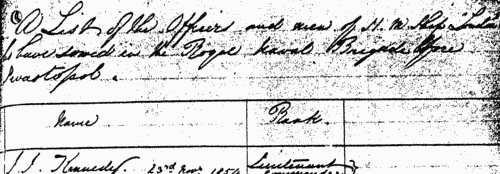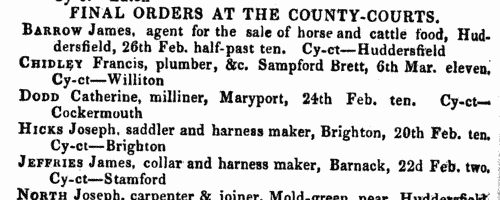Lampard Surname Ancestry ResultsOur indexes 1000-1999 include entries for the spelling 'lampard'. In the period you have requested, we have the following 162 records (displaying 81 to 90): Single Surname Subscription | | | Buying all 162 results of this search individually would cost £960.00. But you can have free access to all 162 records for a year, to view, to save and print, for £100. Save £860.00. More... |
These sample scans are from the original record. You will get scans of the full pages or articles where the surname you searched for has been found. Your web browser may prevent the sample windows from opening; in this case please change your browser settings to allow pop-up windows from this site.  Sailors and marines on H. M. S. London in the Crimean War
(1854-1856) Sailors and marines on H. M. S. London in the Crimean War
(1854-1856)
Sebastopol in the Crimea was the great Russian naval arsenal on the Black Sea. A combined assault by British, French and Turkish troops resulted in the reduction of Sebastopol and led to the Treaty of Paris of 27 April 1856, guaranteeing the independence of the Ottoman Empire. By Admiralty Order the Crimea Medal was awarded to sailors and marines present during the campaign, between 17 September 1854 (the first landing at Eupatoria) and 9 September 1855 (when the allies secured Sebastopol). The sailors' medals were mostly delivered to them on board ship in the course of 1856; the marines' medals were sent to their respective headquarters for distribution. The remarks as to distribution in this medal roll therefore give more specific information as to the whereabouts of the sailor recipients in 1856 than about the marines. Her Majesty's Ship London, a 90-gun sailing ship, took part in the assault. Four clasps to this medal were awarded to the men present in the actions at Sebastopol itself, Inkerman, Balaklave (Balaclava) and (the sea of) Azoff, but the recipients of these clasps are recorded on separate rolls, not part of this index, but indexed on this site.LAMPARD. Cost: £8.00.  | Sample scan, click to enlarge

|  Sailors of H. M. S. London who fought at Sebastopol
(1854-1856) Sailors of H. M. S. London who fought at Sebastopol
(1854-1856)
Sebastopol in the Crimea was the great Russian naval arsenal on the Black Sea. A combined assault by British, French and Turkish troops resulted in the reduction of Sebastopol and led to the Treaty of Paris of 27 April 1856, guaranteeing the independence of the Ottoman Empire. By Admiralty Order the Crimea Medal was awarded to sailors and marines present during the campaign, between 17 September 1854 (the first landing at Eupatoria) and 9 September 1855 (when the allies secured Sebastopol). Her Majesty's Ship London, a 90-gun sailing ship, took part in the assault. Four clasps to this medal were awarded to the men present in the actions at Sebastopol itself, Inkerman, Balaklave (Balaclava) and (the sea of) Azoff. Here we have the list of the men from the ship who served as part of the naval brigade that actually fought at Sebastopol (Sevastopol, Sevastapol).LAMPARD. Cost: £8.00.  | Sample scan, click to enlarge

| Contributors to the Phonetic Fund
(1856)
The Phonetic Journal, published weekly, contains English texts rendered phonetically, and news about the promotion of phonetic reform and phonography. The section entitled Intelligence included lists of new members of the Phonetic Society, alterations (such as changes of address), and lists of contributions to the Phonetic Fund. The lists of new members give full name (surname first) and address, preceded by a number indicating the class or grade achieved in their phonetic studies. In the tables of contributions, full names and addresses are only given for the major donors; the mass of small contributors are listed by surname and initials.LAMPARD. Cost: £6.00.  | Sample scan, click to enlarge

| New Members of the Phonetic Society
(1856)
The Phonetic Journal, published weekly, contains English texts rendered phonetically, and news about the promotion of phonetic reform and phonography. The section entitled Intelligence included lists of new members of the Phonetic Society, alterations (such as changes of address), and lists of contributions to the Phonetic Fund. The lists of new members give full name (surname first) and address, preceded by a number indicating the class or grade achieved in their phonetic studies. In the tables of contributions, full names and addresses are only given for the major donors; the mass of small contributors are listed by surname and initials.LAMPARD. Cost: £6.00.  | Sample scan, click to enlarge

| Traders and professionals in London
(1856)
The Post Office London Directory for 1856 includes this 'Commercial and Professional Directory', recording over 100,000 individuals. LAMPARD. Cost: £4.00.  | Sample scan, click to enlarge

|  London Policemen
(1843-1857) London Policemen
(1843-1857)
The Metropolitan Police Register of Joiners (MEPO 4/334) lists policemen joining the force 1 January 1843 to 1 April 1857 (warrant numbers 19893 to 35804). The register is alphabetical, in so far as the recruits are listed chronologically grouped under first letter of surname. It gives Date of Appointment, Name, Number of Warrant, Cause of Removal from Force (resigned, dismissed, promoted or died), and Date of Removal. Although the register was closed for new entrants at the end of 1842, the details of removals were always recorded, some being twenty or more years later. Those recruits not formerly in the police, the army, or some government department, were required to provide (normally) at least two letters of recommendation from persons of standing, and details of these are entered on the facing pages: the names in these are indexed separately - this index refers only to the police constables. Where a recruit was only recently arrived in the metropolis, the names and addresses of the recommenders can be invaluable for tracing where he came from.LAMPARD. Cost: £8.00.  | Sample scan, click to enlarge

| Insolvents
(1857)
Insolvency notices for England and Wales: insolvency often caused people to restart their lives elsewhere, so these are an important source for lost linksLAMPARD. Cost: £6.00.  | Sample scan, click to enlarge

| Insolvents in England and Wales
(1858)
Perry's Bankrupt and Insolvent Gazette, issued monthly, included lists of insolvencies and stages in the process whereby the insolvents petitioned for release from debtors' prison. The insolvent is generally referred to by name (surname first), address and trade. This is the index to the names of the insolvents, from the issues from January to December 1858.LAMPARD. Cost: £6.00.  | Sample scan, click to enlarge

| Long-stay Paupers in Workhouses: Portsea Island
(1861)
This comprehensive return by the Poor Law Board for England and Wales in July 1861 revealed that of the 67,800 paupers aged 16 or over, exclusive of vagrants, then in the Board's workhouses, 14,216 (6,569 men, 7,647 women) had been inmates for a continuous period of five years and upwards. The return lists all these long-stay inmates from each of the 626 workhouses that had been existence for five years and more, giving full name; the amount of time that each had been in the workhouse (years and months); the reason assigned why the pauper in each case was unable to sustain himself or herself; and whether or not the pauper had been brought up in a district or workhouse school (very few had). The commonest reasons given for this long stay in the workhouse were: old age and infirm (3,331); infirm (2,565); idiot (1,565); weak mind (1,026); imbecile (997); and illness (493). LAMPARD. Cost: £6.00.  | Sample scan, click to enlarge

| Long-stay Paupers in Workhouses: Wilton
(1861)
This comprehensive return by the Poor Law Board for England and Wales in July 1861 revealed that of the 67,800 paupers aged 16 or over, exclusive of vagrants, then in the Board's workhouses, 14,216 (6,569 men, 7,647 women) had been inmates for a continuous period of five years and upwards. The return lists all these long-stay inmates from each of the 626 workhouses that had been existence for five years and more, giving full name; the amount of time that each had been in the workhouse (years and months); the reason assigned why the pauper in each case was unable to sustain himself or herself; and whether or not the pauper had been brought up in a district or workhouse school (very few had). The commonest reasons given for this long stay in the workhouse were: old age and infirm (3,331); infirm (2,565); idiot (1,565); weak mind (1,026); imbecile (997); and illness (493). LAMPARD. Cost: £6.00.  | Sample scan, click to enlarge

|
Research your ancestry, family history, genealogy and one-name study by direct access to original records and archives indexed by surname.
|













